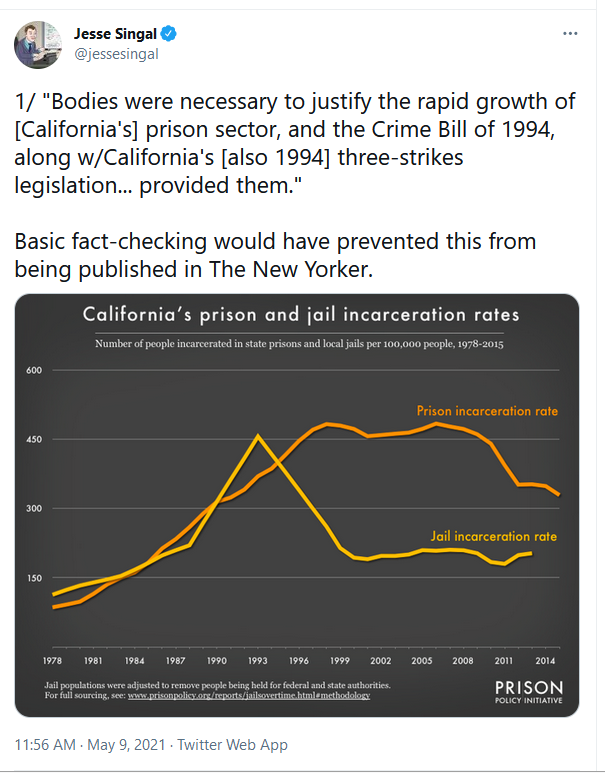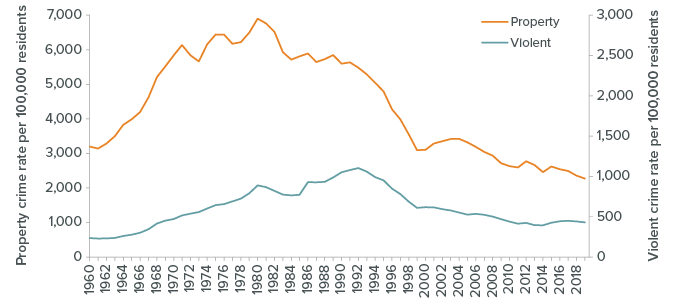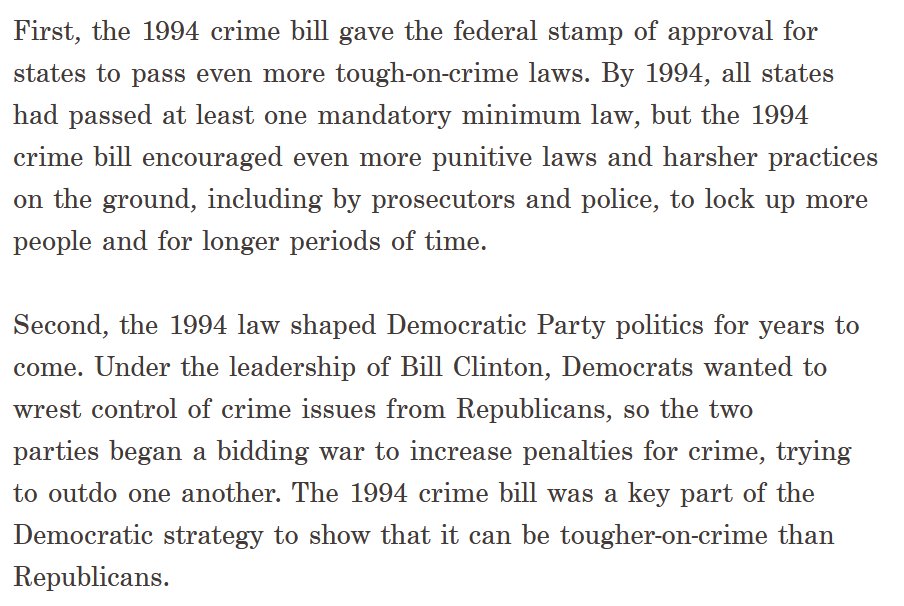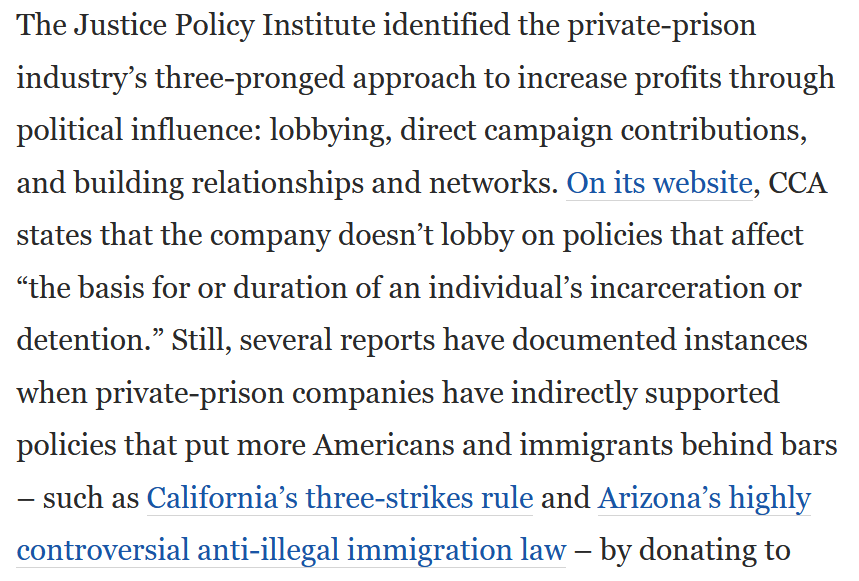This is frustrating for me to see, because @jessesingal and @KeeangaYamahtta both oversimplify.
Taylor is correct on substance. But Singal is right that more stringent fact-checking would have changed the details of this paragraph.
(Thread)
https://twitter.com/jessesingal/status/1391467127954083841">https://twitter.com/jessesing...
Taylor is correct on substance. But Singal is right that more stringent fact-checking would have changed the details of this paragraph.
(Thread)
https://twitter.com/jessesingal/status/1391467127954083841">https://twitter.com/jessesing...
The connection between those two laws - the 1994 crime bill and CA& #39;s 1994 three-strikes law - and California& #39;s prison population is not self-evident.
The 1994 Crime Bill is a federal law, not a CA law. And the steep increase in incarceration was well underway before 1994.
The 1994 Crime Bill is a federal law, not a CA law. And the steep increase in incarceration was well underway before 1994.
Furthermore, CA& #39;s three-strikes law was created by a voter referendum. Taylor& #39;s article implies this law was motivated by a need to fill prisons, but I have a hard time believing that this is what motivated CA voters to pass this bill.
(But see below!)
(But see below!)
But Taylor& #39;s not totally wrong. By 1999, over 40,000 CA prisoners - about a fourth of the total - had been sentenced under the three-strikes law. It& #39;s implausible that the three-strikes law didn& #39;t have any effect on California& #39;s prison population.
https://www.prisonpolicy.org/scans/sp/3strikes.pdf">https://www.prisonpolicy.org/scans/sp/...
https://www.prisonpolicy.org/scans/sp/3strikes.pdf">https://www.prisonpolicy.org/scans/sp/...
But how could a 1994 law have had an effect, if the trend started before 1994?
Because there was a big counter-trend pushing incarcerations down even as laws like the three strikes law were pushing upward. The crime rate was plummeting.
https://www.ppic.org/publication/crime-trends-in-california/">https://www.ppic.org/publicati...
Because there was a big counter-trend pushing incarcerations down even as laws like the three strikes law were pushing upward. The crime rate was plummeting.
https://www.ppic.org/publication/crime-trends-in-california/">https://www.ppic.org/publicati...
And although the 1994 Crime Bill was a federal law, it still had a big impact on state laws. It provide $12.5 billion in grants to states to pay for incarceration. States that passed "tough-on-crime" got more money. https://www.brennancenter.org/our-work/analysis-opinion/1994-crime-bill-and-beyond-how-federal-funding-shapes-criminal-justice">https://www.brennancenter.org/our-work/...
It also, as the ACLU argues, signaled that the Democratic party under Bill Clinton would compete with the GOP to be the most pro-conviction, pro-incarceration party.
https://www.aclu.org/blog/smart-justice/mass-incarceration/how-1994-crime-bill-fed-mass-incarceration-crisis">https://www.aclu.org/blog/smar...
https://www.aclu.org/blog/smart-justice/mass-incarceration/how-1994-crime-bill-fed-mass-incarceration-crisis">https://www.aclu.org/blog/smar...
This was all happening in part because the private prison industry was using lobbying, donations to politicians, and propaganda to get more "tough on crime" laws passed.
https://www.prisonlegalnews.org/news/2016/aug/22/study-shows-private-prison-companies-use-influence-increase-incarceration/">https://www.prisonlegalnews.org/news/2016...
https://www.prisonlegalnews.org/news/2016/aug/22/study-shows-private-prison-companies-use-influence-increase-incarceration/">https://www.prisonlegalnews.org/news/2016...
Including California& #39;s three-strikes bill.
https://www.washingtonpost.com/posteverything/wp/2015/04/28/how-for-profit-prisons-have-become-the-biggest-lobby-no-one-is-talking-about/">https://www.washingtonpost.com/postevery...
https://www.washingtonpost.com/posteverything/wp/2015/04/28/how-for-profit-prisons-have-become-the-biggest-lobby-no-one-is-talking-about/">https://www.washingtonpost.com/postevery...
So I think Taylor& #39;s paragraph did oversimplify a more complex situation. More stringent fact-checkers would have made him add a disclaimer there.
But Singal doesn& #39;t credit that Taylor was basically right about the larger issue, even though Taylor& #39;s examples needed more nuance.
But Singal doesn& #39;t credit that Taylor was basically right about the larger issue, even though Taylor& #39;s examples needed more nuance.
The prison industry was, in fact, lobbying, donating and supporting candidates to get laws like these passed, and it& #39;s obvious they were doing this to get more bodies so more prisons were needed.
That was (as I see it) the deeper point of Taylor& #39;s paragraph, and it was correct.
That was (as I see it) the deeper point of Taylor& #39;s paragraph, and it was correct.
(End of rant.)

 Read on Twitter
Read on Twitter





